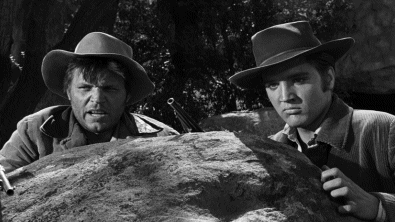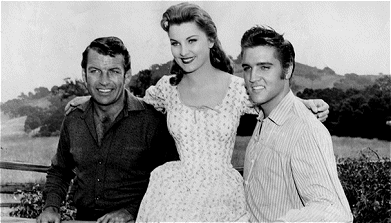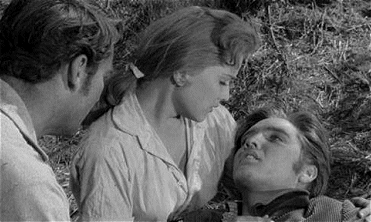Sixties
City presents
a wide-ranging series of
articles on all aspects of the Sixties, penned by the creator of the iconic
60s music paper Mersey
Beat
|
Sixties
City presents
a wide-ranging series of
articles on all aspects of the Sixties, penned by the creator of the iconic
60s music paper Mersey
Beat
|
|||||
|
|
A monochrome
film, basically a run-of-the-mill Western, released in 1956, produced
by David Weisbart and directed by Robert D. Webb from the novel 'The Reno
Brothers' by Maurice Geraghty with a script by Robert Buckner. The film
was originally called 'The Reno Brothers' and Robert Wagner and Jeffrey
Hunter were considered for the role of Clint Reno. The Reno Brothers Frank,
John, Simeon, Clinton and William really existed and carried out the first
train robbery in American history on 6th October 1866. The real Clint
Reno was born in 1843 and died in 1865.
When Elvis was cast, receiving $100,000 for his fee, the part of Clint Reno was relatively small but was built up especially for Elvis, although it became the only film in which he didn't receive top billing - that went to Richard Egan and Debra Paget. He also wasn't seen until 20 minutes into the film, appearing as a distant figure pushing a plough. When Elvis arrived at the Fox Studio in August 1956 he not only knew his own lines - but those of everyone else in the cast. He addressed everyone as either 'Sir' or 'Ma'am', which soon endeared him to people who were initially sceptical about him appearing in the movie. Being an average Western there were originally no songs in the initial script. Elvis had been assured that the film wouldn't be a musical, but was presented with four songs to sing: 'We're Gonna Move' which he sung on the front porch of the Reno's house and followed with 'Love Me Tender', which he also sang at the end of the film. 'Let Me' was sung at a community get-together when people gathered to build a new schoolhouse and he sang 'Poor Boy' immediately after. Elvis portrayed Clint, a Texas farm hand who was too young to fight when his brothers go off to war. His brother Vance has a sweetheart, Cathy, but when she hears that Vance has been killed, she eventually accepts Clint's proposal and they are married. However, Vance turns up again two years later, having been involved with a train robbery of Union money, which he now wants to return, although other members of the robbers, former Confederate soldiers, object. There is obviously tension when Vance discovers that his youngest brother has married his former sweetheart. Vance and his brothers Ray and Brett become involved with federal agents and Clint joins with the other members of the gang when Mike Gavin, who leads them, turns up. He takes part in a train hold-up to rescue his brothers, but Gavin plots against the brothers and tries to shoot Vance. Clint intervenes, is shot by Gavin, and dies in Cathy's arms. |
 |
 |
'Love Me
Tender' was composed by musical director Ken Darby, who based it on a Civil
War ballad 'Aura Lee' which had originally been published in 1861 with words
by W.W. Fosdick and music by George R. Roulton. Darby also composed the
other songs, but they were all credited to Elvis and Vera Motson, who was
Darby's wife. When asked why he had credited his wife, along with Elvis,
he said "Because she didn't write it either." It was actually publishing
copyright problems between BMI and ASCAP which caused him to give the co-authorship
credits to Elvis and his wife Vera. The original ending had the Reno's mother (Mildred Dunnock) ringing the dinner bell for the three brothers working in the field. An ending had been filmed in which Elvis lived, but it was decided not to use it. However, when preview audiences reacted badly to Elvis's death, the studio had him come back in October and added a scene at the end where his ghostly figure sings 'Love Me Tender.' By this time the colour of his hair had changed. It had been dyed black for the film, so he appears with lighter coloured hair in the end sequence. The film cost less than $1 million to produce and recovered its costs within three weeks. The single 'Love Me Tender' was recorded at Radio Recorders Studio in Hollywood with guitarist Vita Mumolo and background vocals by Chuck Prescott, John Dodson and Red Robinson. The film version had one extra verse. It became the first record in history to achieve an advance order of more than one million copies and topped the charts for four weeks. Elvis first met Paget on 'The Milton Berle Show' on 25th June 1956. Berle asked Elvis which actress he liked and Elvis said, "Debra Paget". Berle then said, "She's not in your league, stick to Heartbreak Hotel and stay away from the Waldorf. She'd never go out with a singer like you, she's much too sophisticated." Debra then came onto the stage, screamed and kissed Elvis. The relationship between Elvis and Debra is unclear. He once remarked, "Debra Paget is the best-looking woman I've seen in Hollywood" and "I sent her flowers, I was nuts about her, but she wouldn't even give me the time of day." Yet she was to state in a 1997 interview that Elvis had actually proposed to her. It was said that she turned him down at one time saying it was because she wasn't interested and at another that her family had prevented her. |
| Richard
Egan, star of the film, was to comment, "They seemed to put him in front
of a backdrop. He could do that easily but he had much more depth. He showed
extraordinary ability to catch on." He was also to say, "That boy could
charm the birds out of the trees. He was so humble and eager. We went out
of our way to help him. He's a natural born actor. Already, he knows as
much as I've learned in ten years." Elvis commented, "If you play yourself you're much better off. Like Jimmy Dean, Marlon Brando…with 'Love Me Tender' I couldn't play myself because this character I was portraying was so far from me it wasn't even funny". Producer David Weisbert, who had produced 'Rebel Without A Cause', compared Elvis to James Dean, saying "So far as teenagers are concerned, Elvis is what I call a safety valve. By that I mean they scream, holler, and let go of their emotions when they see him perform…Elvis is completely out-going, whereas Jimmy was the direct opposite. Basically, Jimmy was a loner, whereas Elvis is gregarious. Elvis is by far the most healthy. Jimmy was apparently the typical confused teenager, but Elvis is something every kid would like to be - a phenomenal success, up there enjoying himself and getting millions of dollars." One of the studio technicians was to say, "I've been in this business for twenty years and I've yet to see any actor as willing to learn as Elvis, and the funny part is, he's a natural. You ought to see the way he tears into a scene." Elvis was to tell his friend, David Phillips, a Memphis disc jockey: "The make-up man gets me up at 5.30 every morning, and I fall into bed at 8.30 every night. This place isn't anything but a workshop. I spent one whole day ploughing mules. That was rough!" The film received its premier at the Paramount Theatre, New York on 15th November 1956, with over 3,000 female fans gathered outside the building, which displayed a thirty foot cut-out of Elvis holding a guitar. Despite the film's success, critics were harsh with the New York Times saying that Elvis was not much more impressive than any of the horses in the film while Time magazine compared his voice to that of a rusty foghorn. Elvis was to say, "It's not a western, it's not a musical. It's a dramatic picture. It's a love story." |
 |
|
Article
Text
UK
web hosting by
|